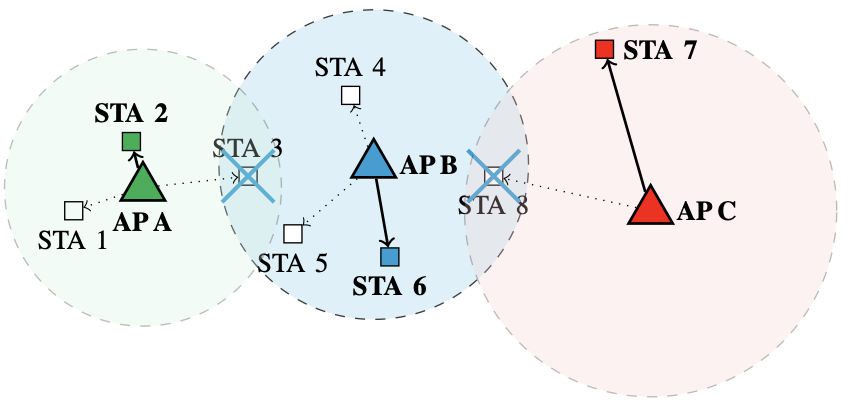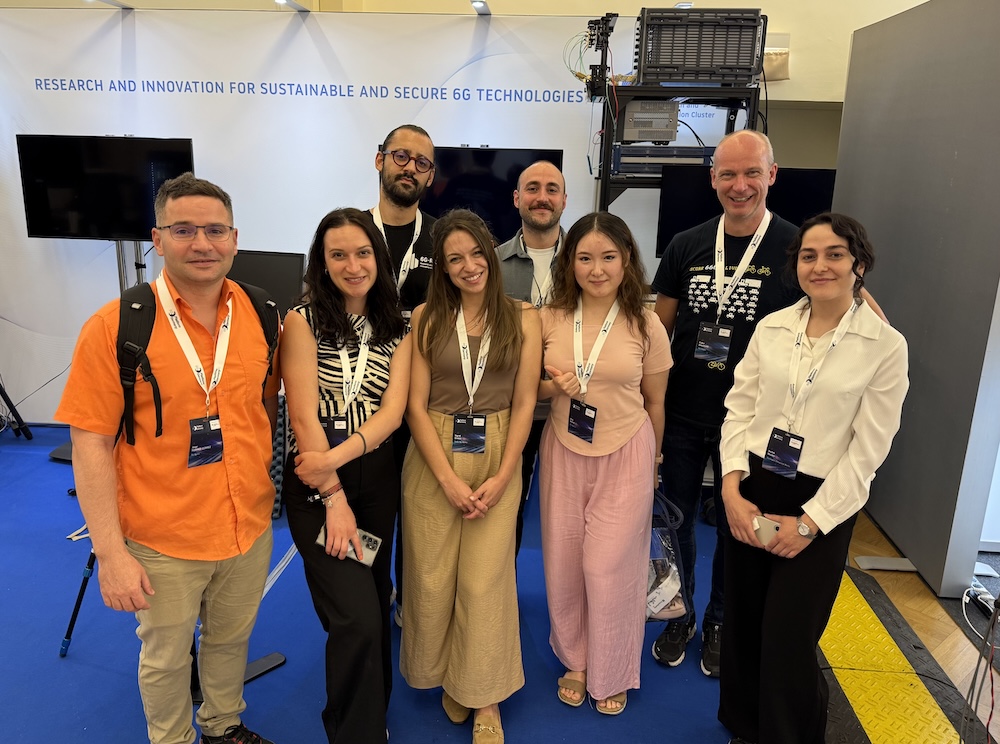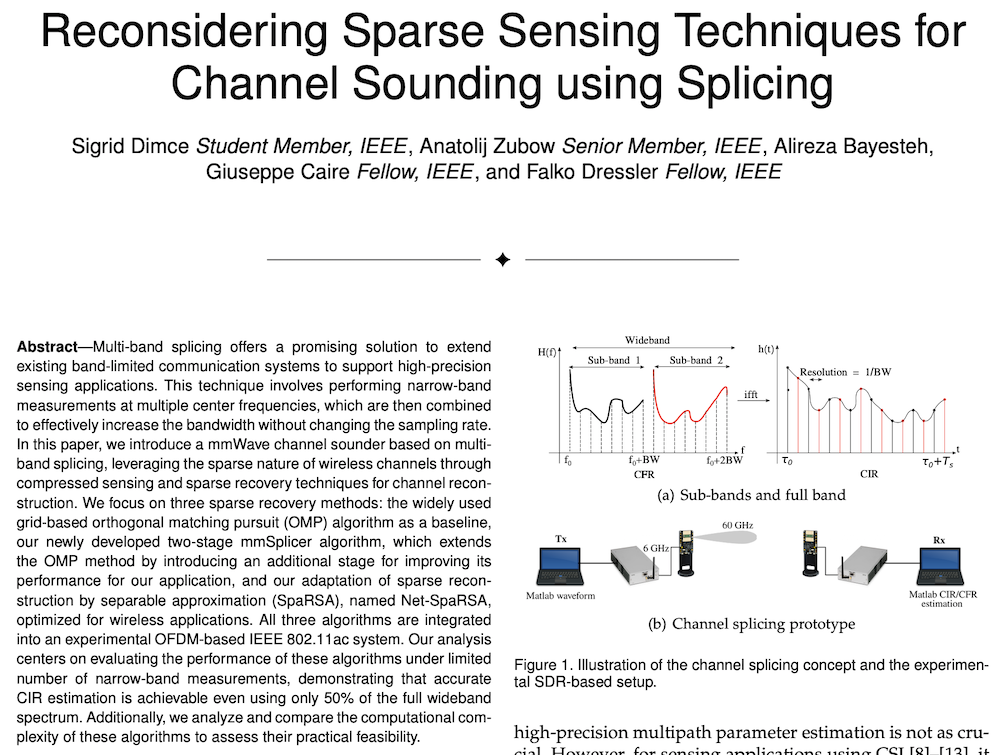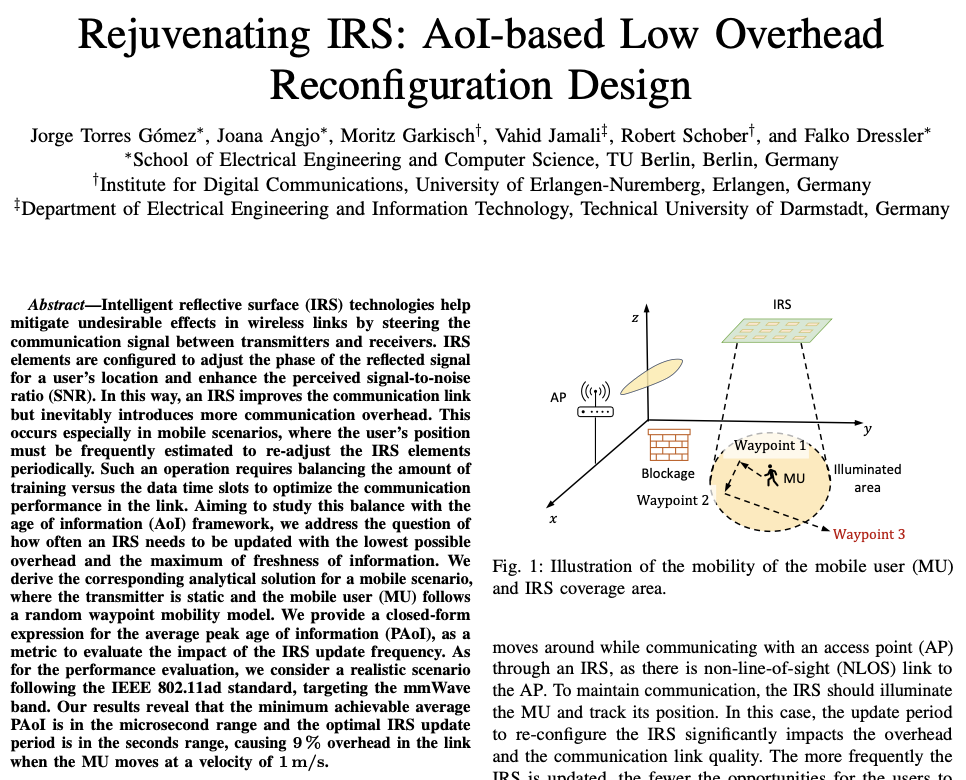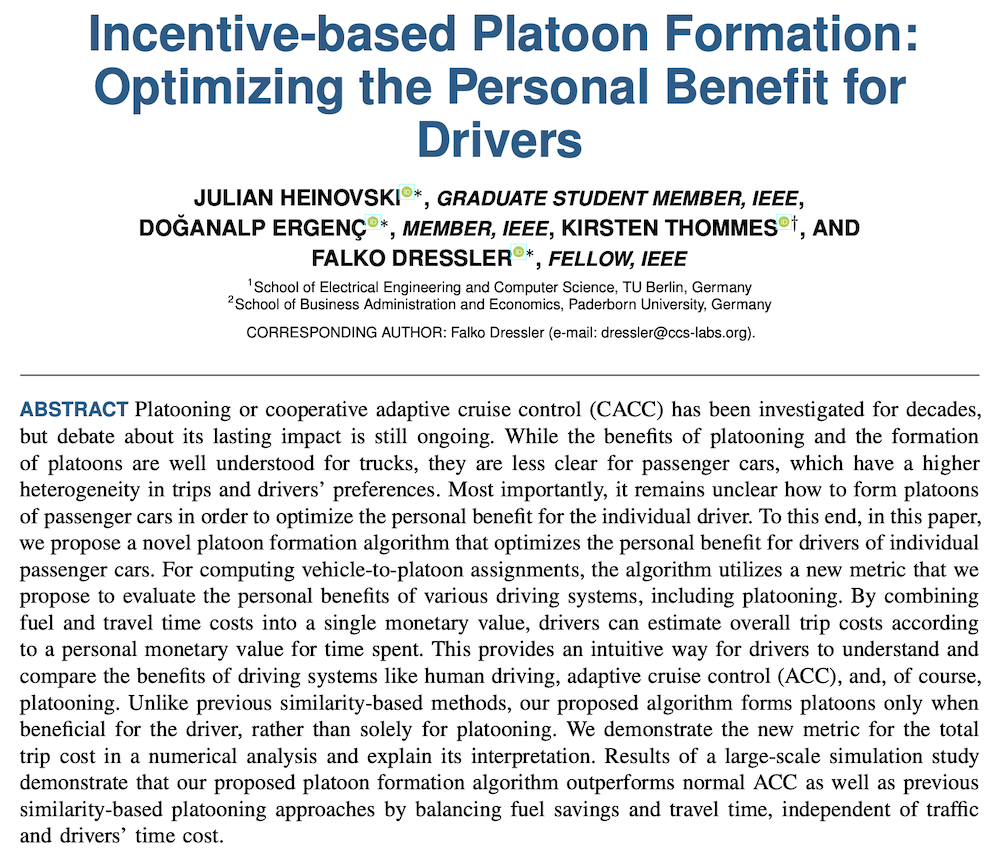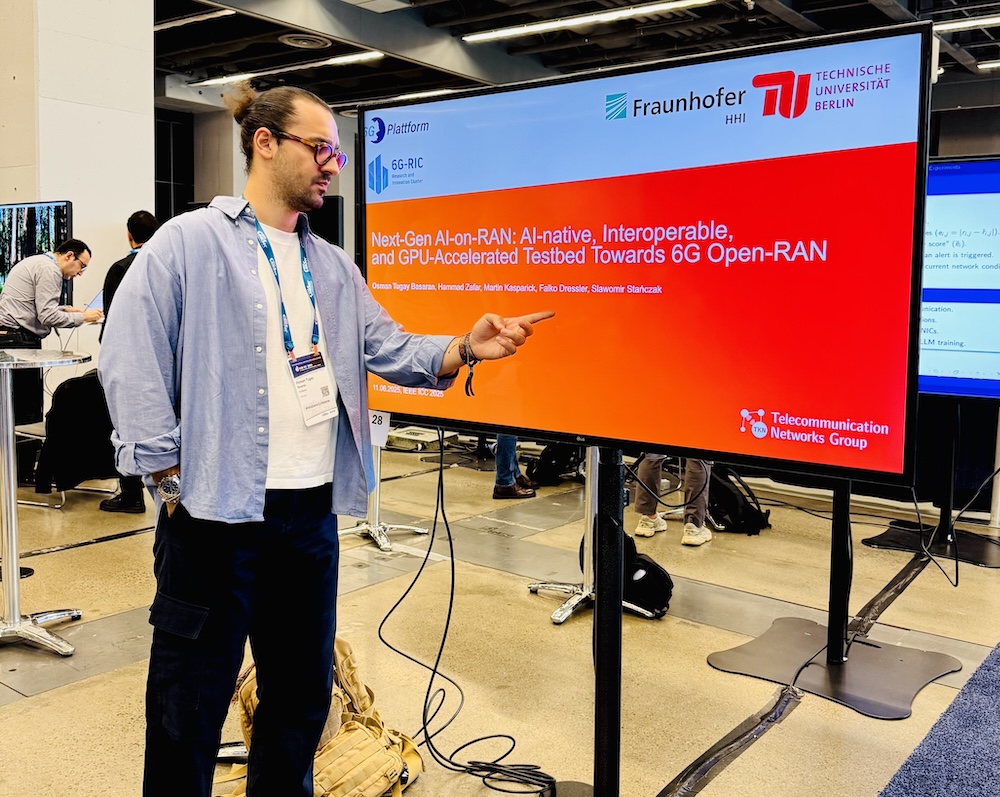SPP 1914 Cyber-Physical Networking


NICCI^2 - Network-Informed Control – Control-Informed network: towards multi techNology dynamICally ChangIng networks
Institutions
- TU Berlin
- Paderborn University
- Otto-von-Guericke University Magdeburg
Team @ TKN
- Prof. Dr. Falko Dressler (PI)
- Sigrid Dimce
- Julian Heinovski
- Max Schettler
- Muhammad Sohaib Amjad
- Christos Laskos
Funding
- DFG (Deutsche Forschungsgemeinschaft)
Project Time
- 01/2020 - 12/2023
Description
The opportunities provided by feedback control of networked dynamical systems are enormous. However, it is by no means clear how to harness modern wireless communication, network and computation technologies to develop high-performance cyber-physical systems. The main stumbling blocks stem from the significant gaps which exist between understanding of constituent parts and the challenges faced when bringing them together. One of the key complications is that the traffic demands of the control loops is often considered independently from the communication capabilities. In current setups, the control system has to simply cope with the quality of service provided by the network. Whilst this facilitates an independent design of communication and control systems, the achievable performance is limited. Hence, mostly slow and non safety-critical tasks are currently performed via wireless communication.
These limitations could be overcome by an efficiently integrated overall optimization of control and communication systems. Unfortunately, a practical solution to this optimization problem is infeasible due to the complexity and distributed nature of the overall system. We strive instead for a modular solution. Controllers and network resource management are designed separately, yet exchange information and interact collaboratively. This exchange comprises predictions of control requirements, communication capabilities and technological choices. The developed algorithms at both the control and communication resource management sides, leverage predictions and learn from their respective actions.
Within the first funding phase of this project, we analyzed limits of achievable performance of this class of networked cyber-physical systems. Using suitable deterministic and also stochastic frameworks, we were able to establish minimum requirements on the network, which are necessary to achieve the desired quality of control. We further proposed a number of control-aware scheduling and network-aware control methods wherein information between network manager and controller is exchanged sporadically. Our insights motivate numerous interesting and relevant research questions to be investigated within a second funding period.
In the second funding phase of the project, we aim to further elucidate fundamental tradeoffs and develop modular approaches for the design of networked cyber-physical systems. We will focus on practical cases where heterogeneous and complementary wireless communication technologies with time and state-dependent properties are available. Integrating such technologies into possibly large-scale cyber-physical systems with feedback is highly non-trivial. To be successful, we will fuse channel predictions, machine learning and estimation techniques with optimization-based methods for scheduling and control. We will exemplarily test and refine our algorithms on networked vehicle systems and industry 4.0 test scenarios with robots.
Selected Publications
2024
Journals and Magazines
 Justin M. Kennedy, Jason J. Ford, Daniel E. Quevedo and Falko Dressler, "Innovation-Based Remote State Estimation Secrecy with no Acknowledgments," IEEE Transactions on Automatic Control, vol. 69 (11), pp. 7433–7448, November 2024.
[DOI, BibTeX, PDF, More details]
Justin M. Kennedy, Jason J. Ford, Daniel E. Quevedo and Falko Dressler, "Innovation-Based Remote State Estimation Secrecy with no Acknowledgments," IEEE Transactions on Automatic Control, vol. 69 (11), pp. 7433–7448, November 2024.
[DOI, BibTeX, PDF, More details]
2023
Journals and Magazines
 Justin M. Kennedy, Julian Heinovski, Daniel E. Quevedo and Falko Dressler, "Centralized Model-Predictive Control with Human-Driver Interaction for Platooning," IEEE Transactions on Vehicular Technology, vol. 72 (10), pp. 12664–12680, October 2023.
[DOI, BibTeX, PDF, More details]
Justin M. Kennedy, Julian Heinovski, Daniel E. Quevedo and Falko Dressler, "Centralized Model-Predictive Control with Human-Driver Interaction for Platooning," IEEE Transactions on Vehicular Technology, vol. 72 (10), pp. 12664–12680, October 2023.
[DOI, BibTeX, PDF, More details] Michele Segata, Renato Lo Cigno, Tobias Hardes, Julian Heinovski, Max Schettler, Bastian Bloessl, Christoph Sommer and Falko Dressler, "Multi-Technology Cooperative Driving: An Analysis Based on PLEXE," IEEE Transactions on Mobile Computing, vol. 22 (8), pp. 4792–4806, August 2023.
[DOI, BibTeX, PDF, More details]
Michele Segata, Renato Lo Cigno, Tobias Hardes, Julian Heinovski, Max Schettler, Bastian Bloessl, Christoph Sommer and Falko Dressler, "Multi-Technology Cooperative Driving: An Analysis Based on PLEXE," IEEE Transactions on Mobile Computing, vol. 22 (8), pp. 4792–4806, August 2023.
[DOI, BibTeX, PDF, More details]
2022
Technical Reports and Regional Workshops
- Justin M. Kennedy, Jason J. Ford, Daniel E. Quevedo and Falko Dressler, "Innovation-Based Remote State Estimation Secrecy with no Acknowledgments," arXiv, less.SY, 2212.08234, December 2022. [DOI, BibTeX, PDF, More details]
- Justin M. Kennedy, Julian Heinovski, Daniel E. Quevedo and Falko Dressler, "Centralized Model-Predictive Control with Human-Driver Interaction for Platooning," arXiv, cs.MA, 2205.09259, May 2022, pp. 1–15. [DOI, BibTeX, PDF, More details]
2021
Conferences and Workshops
 Florian Klingler, Max Schettler, Sigrid Dimce, Muhammad Sohaib Amjad and Falko Dressler, "mmWave on the Road – Field Testing IEEE 802.11ad WLAN at 60 GHz," Proceedings of 40th IEEE International Conference on Computer Communications (INFOCOM 2021), Poster Session, Virtual Conference, May 2021.
[DOI, BibTeX, PDF, More details]
Florian Klingler, Max Schettler, Sigrid Dimce, Muhammad Sohaib Amjad and Falko Dressler, "mmWave on the Road – Field Testing IEEE 802.11ad WLAN at 60 GHz," Proceedings of 40th IEEE International Conference on Computer Communications (INFOCOM 2021), Poster Session, Virtual Conference, May 2021.
[DOI, BibTeX, PDF, More details] Sigrid Dimce, Muhammad Sohaib Amjad and Falko Dressler, "mmWave on the Road: Investigating the Weather Impact on 60 GHz V2X Communication Channels," Proceedings of 16th IEEE/IFIP Conference on Wireless On demand Network Systems and Services (WONS 2021), Virtual Conference, March 2021.
[DOI, BibTeX, PDF, More details]
Sigrid Dimce, Muhammad Sohaib Amjad and Falko Dressler, "mmWave on the Road: Investigating the Weather Impact on 60 GHz V2X Communication Channels," Proceedings of 16th IEEE/IFIP Conference on Wireless On demand Network Systems and Services (WONS 2021), Virtual Conference, March 2021.
[DOI, BibTeX, PDF, More details]
2020
Conferences and Workshops
 Muhammad Sohaib Amjad, Max Schettler, Sigrid Dimce and Falko Dressler, "Inband Full-Duplex Relaying for RADCOM-based Cooperative Driving," Proceedings of 12th IEEE Vehicular Networking Conference (VNC 2020), Virtual Conference, December 2020.
[DOI, BibTeX, PDF, More details]
Muhammad Sohaib Amjad, Max Schettler, Sigrid Dimce and Falko Dressler, "Inband Full-Duplex Relaying for RADCOM-based Cooperative Driving," Proceedings of 12th IEEE Vehicular Networking Conference (VNC 2020), Virtual Conference, December 2020.
[DOI, BibTeX, PDF, More details]

